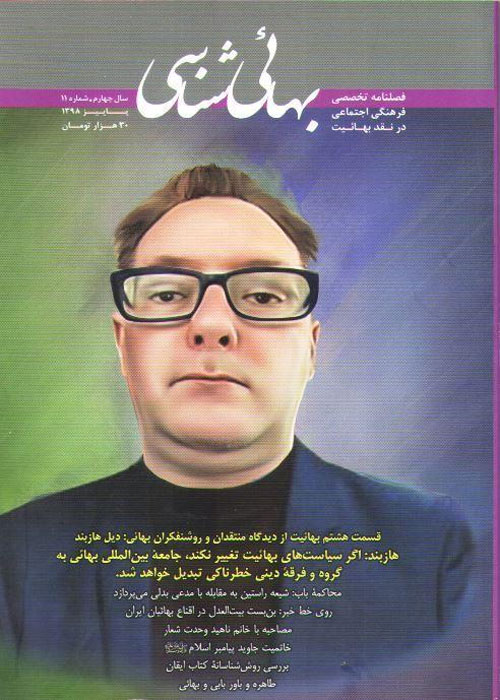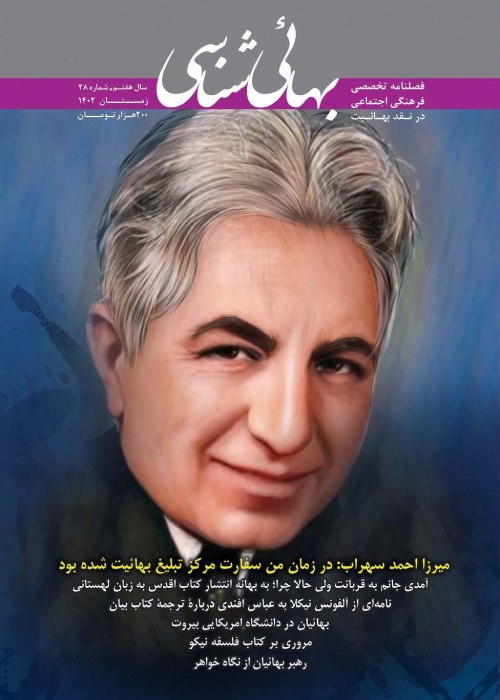فهرست مطالب

نشریه بهائی شناسی
پیاپی 11 (پاییز 1398)
- 240 صفحه، بهای روی جلد: 300,000ريال
- تاریخ انتشار: 1398/10/10
- تعداد عناوین: 10
- سرمقاله
-
صفحه 4
-
نفوذ یا راهبردصفحه 13
-
آینه آیین/ تبلیغ حتی از طریق خشونتصفحه 14
-
شعار وحدتصفحه 16
-
صفحه 56
دیل هازبند از پژوهشگران و نویسندگانی است که طی حدود 9 سال عضویت در جامعه و تشکیلات بهائی، با تعالیم وآموزه های بهائی آشنا شد و پس از مدتی به نقاط ضعف، اشتباهات، تعارض ها، شکست ها و نارسایی های بهائیت پی برد و در نامه ای خطاب به محفل ملی بهائیان امریکا، اعلام نمود: «پس از سال ها تحقیق و تحری حقیقت، سرانجام به این نتیجه و تصمیم غم انگیز رسیدم که دیگر نمی توانم باور و اعتقادی به بهاءالله یا هریک از نهادها و موسسات تاسیس شده تحت نام او، همچون ولایت امرالله و بیت العدل جهانی، داشته باشم. من کاملا متقاعد شده ام که بهائیت در تحقق اهداف و تعالیم خود، مبنی بر ایجاد صلح، وحدت و ایجاد عصر طلائی برای جامعه بشری، ناتوان و محکوم به شکست است». هازبند معتقد به عصمت و مصون از خطا بودن رهبران بهائی نیست و قبول چنین اعتقادی را حرکت به سوی دیکتاتوری و استبداد درون جامعه بهائی می داند. او به مشروعیت رهبری بهائی، بعد از عبدالبهاء انتقاد شدید دارد و معتقد است پس از عبدالبهاء، رهبری بهائیت باید به برادرش محمدعلی افندی سپرده می شد. هازبند بیت العدل (رهبری فعلی بهائیت در اسرائیل) را غیرمشروع می داند و معتقد است بهائیت با گذشت بیش از 170 سال از عمرش، هیچ دستاورد ارزشمندی را به ارمغان نیاورده است. او طرفدار بهائیان وحدتگرا است و انتقادهای زیادی را به بهائیت وارد آورده است.
-
باب در محکمه (گزیده) / محاکمه باب: شیعه راستین به مقابله با مدعی بدلی می پردازدصفحه 90
-
صفحه 184
تشکیلات بهائی در دهه های اخیر تبلیغات بسیاری را بر فاطمه بیگم برغانی، ملقب به طاهره قرهالعین، متمرکز نموده تا از او به عنوان یک الگوی زن اصلاح طلب، روشنفکر و آزادی خواه بهائی بهره برداری تبلیغی نماید. لذا هرازچندگاه، همایش و سمیناری در این موضوع در خارج از کشور برگزار نموده و به تعریف و تمجید از دیدگاه های او می پردازد. در یکی از این همایش ها، خانم مهرانگیز کار، از سخنرانان مدعو، در پایان سخنان خود گفت: آیا اگر طاهره امروز زنده شود، تشکیلات بهائی حاضر است او را کاندیدای عضویت در بیت العدل نماید؟! (توجه کنید که زنان از حضور در بیت العدل نهاد رهبری جامعه جهانی بهائی محرومند). این جمله کوتاه موجب حملات گسترده ای به سخنران شد و سرانجام بیت العدل ناچار شد بیانیه بدهد و موضوع را خاموش کند. در این مقاله تلاش شده است با ارائه مدارک و مستندات مختلف، دیدگاه منابع بهائی نسبت به باورهای طاهره، روشن شود و دو رویکرد درباره او تبیین گردد. در رویکرد اول، باب و آیین بابی (همان باور طاهره) موردستایش است تاآنجاکه بهاءالله بر کسی که بگوید وی آیین بابی را نسخ نموده، لعنت می فرستد؛ اما در رویکرد دوم، بر بابیان و باورها و اعمالشان اعتراض می شود و محکوم می گردند. البته رویکرد کنونی بیت العدل هم چیزی جز این هاست. در این مقاله با توجه به مستندات ارائه شده، عدم صداقت رهبران پیشین و کنونی بهائیت آشکار می شود.
کلیدواژگان: طاهره، قره العین، باب، بابیت، بهائیت، کشف الغطاء، خشونت، داعش -
صفحه 206
کتاب ایقان پس از کتاب اقدس مهم ترین کتاب بهائیان است. موادش در نگاه آنان وحی آسمانی و سخن خداوندی است. این کتاب با دو نگاه نقد شده است؛ یکی، استدلال ها و تاویل های بهاءالله و دیگر، از منظری روش شناسانه. در این مقاله، دست بردهای عامدانه بهائیان در درست کردن نادرستی های کتاب ایقان در 9 نسخه خطی یا چاپی این کتاب مورد بررسی قرار گرفته است. تفاوت های موجود در این نسخه های نه گانه را در پنج گروه می توان جای داد: حذف جایگاه میرزا یحیی صبح ازل؛ تصحیح آیات نادرست نوشته شده قرآن؛ تغییر واژگان؛ تصحیح اشتباه های ادبیاتی عربی و تصحیح اشتباه های ادبیاتی فارسی. در این مقاله به طور خاص به گروه نخست پرداخته شده است. حذف عبارت «کلمه مستور» که با توجه به قرینه های درست تاریخی به ریاست معنوی میرزا یحیی صبح ازل بر بابیان و جانشینی اش نسبت به سید علی محمد باب بازمی گشت، نشانه ای از نادرستی دعوی من یظهره اللهی میرزا حسینعلی بهاءالله در محدوده آموزه های بابی است. گذشته از این، تصحیح نادرستی های گوناگون در کتاب ایقان توسط بهائیان نیز با وحیانی دانستن شان از سوی ایشان همسانی ندارد.
کلیدواژگان: ایقان، میرزا یحیی صبح ازل، میرزا حسین علی بهاءالله، نادرست نویسی های ایقان، اصلاحات ایقان -
صفحه 232
-
Page 56
Dale Husband is one of the leading Bahai writers and researchers who learned about the Baha'i teachings during his nine years of membership in the Baha'i community and organization, and after a while observed many weaknesses, mistakes, conflicts and failures in it.
In a letter addressing the National Assembly of the Baha'is in the United States of America he said “After years of researching the truth, I finally came to the sad conclusion that I can no longer believe in Baha'u'llah or any of the institutions established under his name, such as the Guardian of the Cause of God, and Universal House of Justice. I am convinced that the Baha'is are incapable to fulfill their goals and teachings of peace, unity, and the creation of a golden age for mankind. Husband does not believe in the innocence and impunity of the Baha'i leaders, and considers accepting such a belief as a move toward dictatorship and tyranny within the Baha'i community.”
He has been critical of the legitimacy of the Baha'i leadership after Abdul Baha, and believes that after Abdul Baha, the Baha'i leadership should have been entrusted to his brother, Mohammad Ali Effendi. Husband considers Universal House of Justice (the current Baha'i leadership in Israel) to be illegitimate and believes that Baha'i faith has not made any significant achievements after more than 170 years of its life.
He is an Advocate of Unitarian Baha’ism and has drawn much criticism toward the UHJ and the authoritarian Baha'ism.Keywords: Baha'i intellectuals, Dale Husband, Unitarian Baha’is, infallibility of Baha'i leaders, false prophecies -
Page 184
It is well known that the Baha'i organization has focused much of its propaganda on the Fatimah Begum Baraghani, nicknamed as Tahirih Qurrat al-Ayn in recent decades, as a Baha'i reformist, intellectual, and freedom-seeking model for the women in Iran. Therefore, they occasionally hold seminars abroad and praise her views. In one of these conferences, One of the invited speakers was Mrs. Mehrangiz Kar, who said at the end of her speech: "If Tahirih had been alive today, was the Baha'i organization ready to accept her as a member to the Universal House of Justice (UHJ)?!" (Because women are forbidden from entering the Universal House of Justice).
This brief sentence triggered widespread attacks on the speaker, who forced Universal House of Justice to make a statement and turn off the subject.
This article attempts to clarify the Baha'i attitudes about the beliefs of Tahirih and presenting their controversial views about her. On the one hand, Tahirih's is praised for believing in Ali Muhammad Bab, so that Bahaullah curse anyone who says that she has abrogated Babi Faith; and on the other hand, the Baha’i sources protest and condemn Babis and their beliefs and practices. In this paper, based on the documents presented in both contexts, it is concluded that such a contradiction is against the truth and honesty.Keywords: Tahirih, Qurrat al-Ayn, Bab, Babis, Baha'i, Kashful Ghitaae, Violence, ISIS -
Page 206
Kitab-i-Iqan (The Book of Certitude) is the most important book of the Baha’is after the book Aqdas. In their eyes, the material is divine revelation and the word of God. This book has been reviewed and criticized in two ways; one, the arguments and interpretations of Baha'u'llah; and the other, with a methodological approach.
In this article, 9 manuscripts or prints of the book of Iqan are examined to show the deliberate changes that Baha'is did to correct the inaccuracies in this book. The differences in these nine versions can be divided into five groups:Eliminating the position of Mirza Yahya Subh-i-Azal;
Correcting the wrong quotes from verses of the Quran; Changing the vocabulary; Correction of Arabic literary errors; and Correction of Persian literary errors.
This article deals specifically with the first group. The omission of the phrase “Hidden Word “which, according to the historical background refers to the spiritual guardianship and leadership of Mirza Yahya Subh-i-Azal over Babis and his succession to Seyed Ali Mohammad Bab. A sign of the false claim of Mirza Hussein Ali Baha’u’llah of being the Man Who Will Be Appeared by God. In addition, the correction of various inaccuracies in the book of Iqan by the Baha'is is in contradiction with their claim that this book is divine.Keywords: Bahaullah, Iqan, Mirza Yahya, Subh-i-Azal, Iqan misquotations, Editions of Iqan, corrections to Iqan


